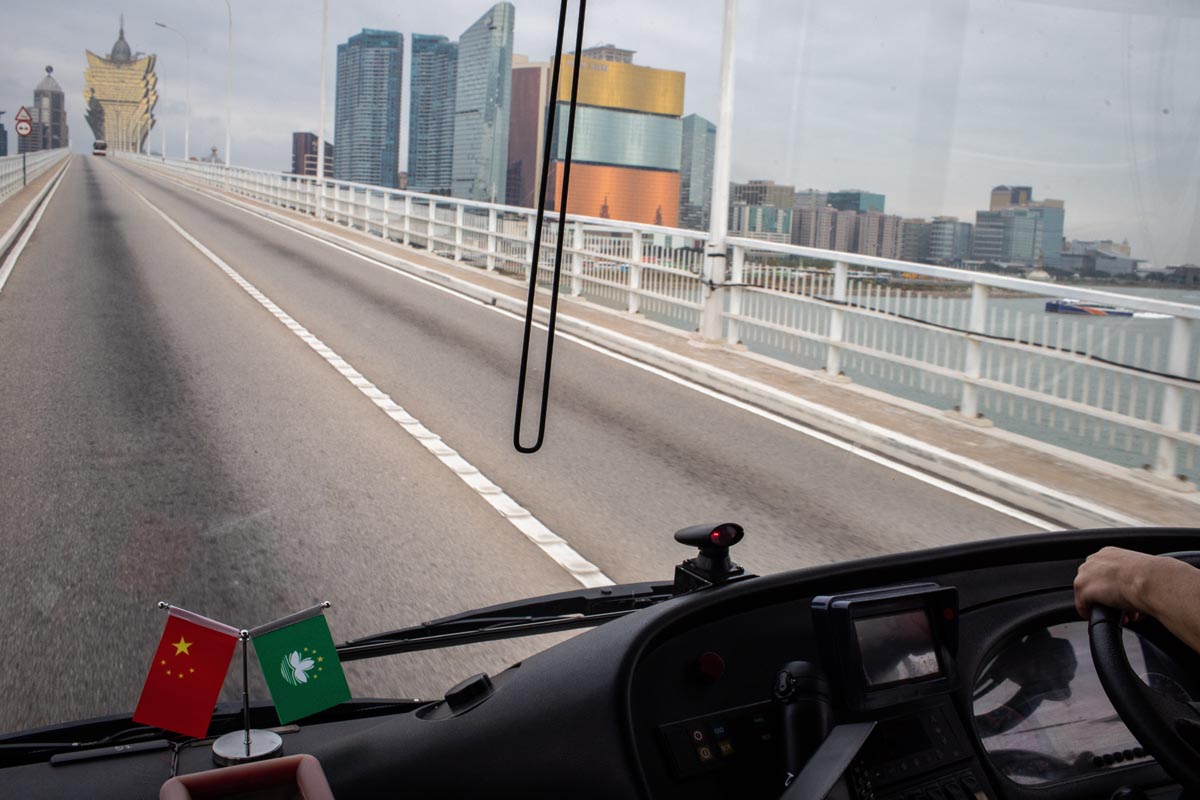PM spells out India’s position on China
I n a recent interview to Newsweek, the Prime Minister, discussing Indo-China relations, commented, “For India, the relationship with China is important and significant.
While protesters in Hong Kong, across the mouth of the Pearl River, are infuriated by what they see as Beijing encroaching on their freedoms, Macau has seen little dissent.

The China and Macau flags are displayed inside a bus crossing the central bridge between Taipa island and the Macau peninsula in Macau on December 19, 2019, as the city marks the 20th anniversary of the handover from Portugal to China. (Eduardo Leal / AFP)
Geopolitics can offer a study in glaring contrast and the grandstanding for President Xi Jinping in Macau was almost spectacular. With Hong Kong on the boil, almost relentlessly since June, the visit by China’s President to Macau on the 20th anniversary of its handover to China is remarkable. Not the least because of the stability in Macau and its unwavering loyalty to Beijing, in refreshing contrast to Hong Kong. On the 22nd anniversary of Britain’s handover of Hong Kong to China (1997), the transfer of the former Portuguese colony in 1999 has been followed by a measure of stability, of a kind that has now been rewarded with President Xi’s three-day visit.
Opposition and acceptance have marked the response of the populace to the two protectorates. The raft of supportive policies, that Mr Xi is expected to announce for Macau are intrinsically China’s reward for the stability… in sharp contrast to the stout posturing amidst the presence of the People’s Liberation Army in Hong Kong. Xi is expected to announce measures for Macau aimed at diversifying its casino-dependent economy into a financial centre, including a new yuan-denominated stock exchange. In contrast, Hong Kong witnessed its second death in a week, provoking the Chinese President to demand an end to the violence that has roiled the island nation.
On his longest official trip to Macau, Xi attended Friday’s swearing-in of Macau’s newly chosen Beijingbacked leader, Ho Iat-seng. Carrie Lam, Hong Kong’s chief executive, enjoys similar support from Beijing but has been fiercely opposed at home. The contrast is palpable, though not many will concur with President Xi’s take that unlike Hong Kong, Macau symbolises what he calls a “shining example of its one country-two systems model”… on China’s terms. Macau returned to Chinese rule on 20 December 1999 with the same “one country-two systems” formula aimed at preserving autonomy under which Hong Kong is governed, or at least theoretically.
Advertisement
While protesters in Hong Kong, across the mouth of the Pearl River, are infuriated by what they see as Beijing encroaching on their freedoms, Macau has seen little dissent. Protests are very rare in the territory with more than half of Macau’s 620,000 population immigrating from China in recent decades. Nonetheless, the authorities have tried to stave off even the faintest indication of trouble.
It thus comes about that the heads of the American Chamber of Commerce in Hong Kong and several journalists had been barred from entering the city in the run-up to Xi’s visit. China has also clamped down on visas since November for mainland residents going to Macau until after the 20 December anniversary, as part of the security restrictions. These restrictions are bound to exert additional pressure on the sliding gambling revenues. Macau is heavily dependent on the gambling industry with its casinos contributing about 80 per cent of government income.
Advertisement